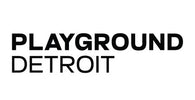The Curators
Noah Elliott Morrison, Featured image credit
Fate played a role in Playground Detroit founders Samantha Bankle Schefman and Paulina Petkoski’s eventual partnership which has, since conception, resulted in close to $200,000 a year in the pockets of local emerging artists. Formed in 2012, Playground Detroit operates as an independent gallery and an agency that represents creatives. The objective: to retain and attract talent in Detroit.
Both Bankle Schefman and Petkoski met in Groves High School in Birmingham, but as Bankle Schefman notes, they didn’t exactly hang out. While Petkoski would go on to pursue her BFA in International Fashion Design from the Fashion Institute of Technology, Bankle Schefman attended Detroit’s College for Creative Studies for metalsmithing. The two would find themselves in New York City, separately and simultaneously working in the fashion and art industries. It wasn’t until their paths crossed nearly a year in that the reality of throw-away fashion began to weigh heavy on them. Both were tired of fulfilling someone else’s dreams. They had the tools. It was time for a change.
“It was really like, ‘Are you going to die for somebody else’s dreams?'” Bankle Schefman says. “I mean, we still kind of do that with Playground because it’s about the artists and creators that we work with, but at least it was our inception to support them.”
Petkoski says there were many factors that led the two back to Detroit. “Our families are here, we’re from here, there’s a long-term vision in terms of placing roots,” she says. But the two also felt they would have more impact in a place like Detroit, “versus New York, where you’re like a drop in the bucket. … We felt like we had to do something here.”
Playground Detroit first began operating out of a 6,000 square-foot loft space in Corktown where they would host monthly artist showcases, before establishing an artist residency program out of Ponyride. While Bankle Schefman and Petkoski got their feet wet, they were also on the hunt for a proper space of their own, which proved to be an exhaustive search.
With help from the Motor City Match Program and a successful Kickstarter campaign that assisted Playground in raising $75,000, Bankle Schefman and Petkoski also took out loans to complete the build-out for the brick-and-mortar space located outside of Eastern Market in Detroit’s McDougall-Hunt area, which opened in November 2017.
Petkoski describes their structure as being “peer-driven” and based heavily on relationship-building. While Playground Detroit actively seeks graduates and up-and-coming talent from the city’s cultural institutes, they also accept online submissions. During an artist’s representation with the Playground Detroit team, they are provided mentorship and intimate advisement on various aspects of art as a business. While the scope of work Playground represents is wide and varied, the heart of the operation has always been about the goals of emerging artists — which, according to Bankle Schefman, is completely up to them. But one thing is required of the artist — and that is drive.
“We won’t work with anyone who isn’t dedicated to making this their primary practice,” Bankle Schefman says. “We want to build a sustainable future for the entire creative economy and community here.”
Since its opening, Playground Detroit has been host to a diverse amount of programming for a wide array of audiences. In addition to their gallery shows, Playground presents artist talks, dinners, and yoga classes, and has partnered with other creative organizations like Google to explore community outreach opportunities. Given this quick success, Bankle Schefman admits that there are many challenges ahead.
“The whole purpose in the beginning was not just to attract and retain talent, but to build an international audience,” she says. “That’s really like the new goal, now that we’re getting comfortable, to take this and the artists further.”
“The impact is not just dollars, it’s also very community-driven by creating those connections between people,” Petkoski says. “You just see growth in people, you see them achieve their own success, and that then is in turn to Playground’s success, and the city’s success. That’s all we can ask for.”
From our 2018 People Issue. Read the original article. July 25, 2018SPECIAL ISSUES » THE PEOPLE ISSUE
The post MetroTimes // Why Paulina Petkoski and Samantha Bankle Schefman decided to go all in on Detroit artists appeared first on PLAYGROUND DETROIT.
